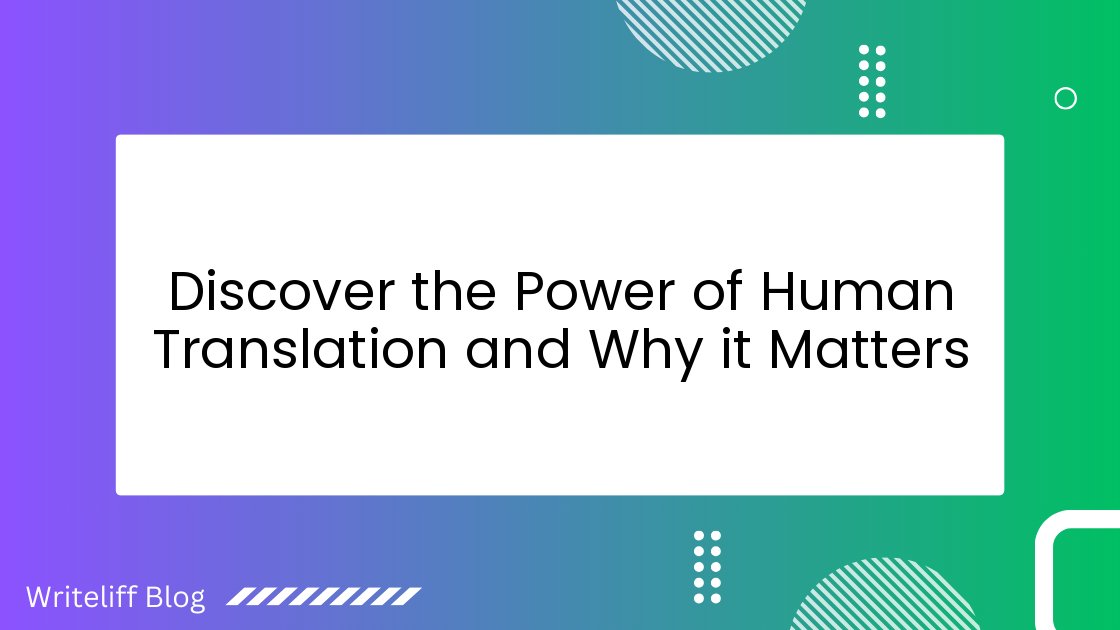Discover the Power of Human Translation and Why it Matters

Greetings, fellow language enthusiasts! As the owner of a thriving translation business, I have witnessed firsthand the transformative power of human translation services. In today’s interconnected world, where communication knows no boundaries, the demand for accurate and culturally nuanced translations has never been higher. In this blog post, I invite you to delve into the remarkable benefits and significance of human translation, and why it should be your preferred choice when it comes to bridging language gaps. So, let’s embark on this linguistic journey together and unlock the true potential of human translation.
The Limitations of Machine Translation
Machine translation has undeniably made great strides in recent years, thanks to advancements in artificial intelligence and neural networks. However, it falls short in several critical aspects:
- Lack of Contextual Understanding: Machines struggle to comprehend the nuances, cultural references, and idiomatic expressions that are intrinsic to human languages. As a result, translations often lack accuracy and fail to capture the intended meaning.
- Cultural Sensitivity: Machine translation fails to account for cultural variations, which can lead to inappropriate or offensive translations. The importance of preserving cultural nuances cannot be overstated, particularly in sensitive fields such as marketing, legal, and healthcare.
- Industry-Specific Knowledge: Technical terminology, jargon, and industry-specific language pose challenges for machine translation. Translators with expertise in specific domains bring invaluable subject knowledge, ensuring precise and contextually appropriate translations.
Why Human Translation Matters
Human translation services provide a distinct advantage over automated solutions, offering a range of benefits that machines simply cannot replicate. Let’s explore why human translation matters:
1. Accuracy and Quality Assurance
When it comes to translation, accuracy is paramount. Human translators possess the linguistic prowess, cultural understanding, and attention to detail required to deliver precise translations. They meticulously craft each sentence, considering the original intent, context, and cultural implications. Human translators also undergo rigorous quality assurance processes, ensuring the final product meets the highest standards.
2. Cultural Nuances and Localization
Languages are deeply intertwined with culture, and translations must reflect this connection. Human translators excel in capturing cultural nuances, adapting content to resonate with the target audience. Whether it’s tailoring marketing messages, localizing software interfaces, or translating literature, human translators ensure that the essence of the source material remains intact while resonating with the target culture.
3. Language Versatility and Adaptability
Human translators possess the unique ability to adapt to various language styles, registers, and tones. They can navigate the intricacies of formal documents, colloquial conversations, and technical content, adapting their translations accordingly. This versatility ensures that the translated text retains its intended impact and effectively communicates with the target audience.
4. Subject Matter Expertise
Effective translation requires more than language proficiency. Subject matter expertise is crucial, particularly in specialized fields such as legal, medical, or technical translations. Human translators with domain-specific knowledge are well-versed in industry terminology, ensuring accurate and contextually appropriate translations. They understand the nuances of the subject matter, guaranteeing precision and clarity in every translated document.
5. Confidentiality and Data Security
Translation often involves sensitive information, ranging from legal contracts to medical records. Human translators prioritize confidentiality and adhere to strict ethical standards. By working directly with a trusted human translation service, you can rest assured that your data remains secure throughout the translation process.
The Cost-Effectiveness of Human Translation
While it’s true that machine translation can seem more cost-effective at first glance, the potential drawbacks and limitations can lead to significant costs in the long run. Here’s why human translation proves to be a wise investment:
- Reduced Revisions: Human translators strive for accuracy and quality from the outset, minimizing the need for time-consuming revisions and corrections that can arise with machine translations.
- Enhanced Reputation: Professional human translation projects a positive image of your business. It demonstrates a commitment to quality, attention to detail, and respect for your target audience’s language and culture, bolstering your reputation in the global marketplace.
- Avoidance of Costly Mistakes: Inaccurate translations can have severe consequences, both financially and legally. By choosing human translation services, you mitigate the risks associated with misleading or incorrect translations, protecting your business from costly errors.
In Conclusion
While machine translation has its place in certain contexts, the irreplaceable value of human translation services cannot be overstated. Human translators bring a unique blend of linguistic expertise, cultural sensitivity, and subject matter knowledge to the table. They navigate the complexities of language, ensuring accuracy, precision, and meaningful communication across cultures.
As a translation business owner, I firmly believe that embracing human translation elevates your global reach, enhances cross-cultural understanding, and fosters meaningful connections. So, the next time you embark on a translation project, remember the power of human translation and choose a reliable human translation service for unparalleled linguistic excellence.